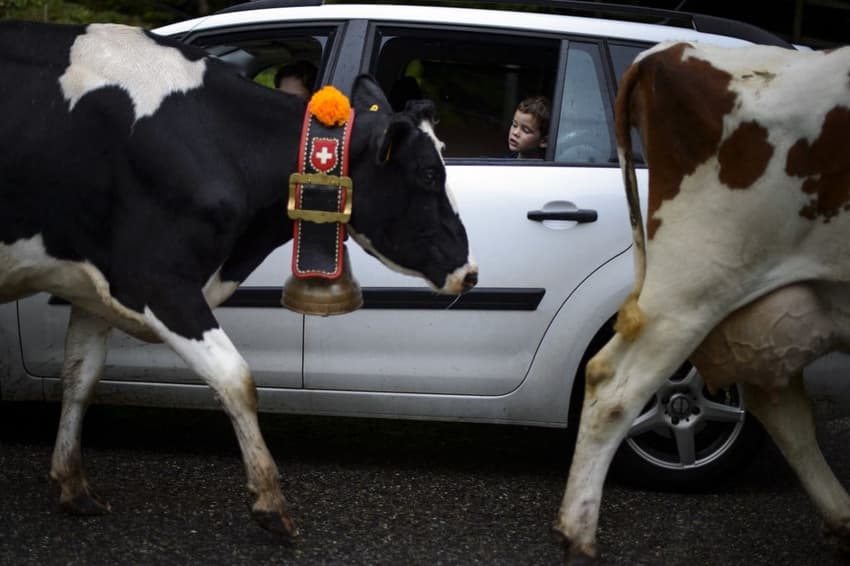Reader question: What does being 'successfully integrated' in Switzerland mean?

One of the criteria for foreigners to be naturalised in Switzerland is that they should be well integrated into Swiss society. In many instances, this requirement is more important than the knowledge of the country’s history.
For the authorities, whether on the federal, cantonal, or municipal level, it is important that new citizens have fully adjusted to, and assimilated, “the Swiss way of life”.
This means that they “should participate in the economic, social and cultural life of society”, according to the State Secretariat for Migration.
This requires not only fluency in the national language of a particular region, but also familiarity with the Swiss way of life and local customs.
READ MORE: Zurich makes naturalisation free for under 25s
While preparing for their naturalisation procedures and questions from officials, many foreigners learn about Switzerland’s history.
They are then surprised when they are asked instead about events of regional importance, such as the meaning of certain local holidays, what the main industries in the area are, or even the names of local wines.
Applicants are also sometimes asked for specific examples of how they participate in the life of their towns or villages, and what local organisations they belong to. Being a member of local choirs or volunteer fire brigades is particularly valued, as it demonstrates the willingness to be part of, and contribute to, their local communities.
This may explain why some people who seemingly qualify for Swiss citizenship because they have lived in the country for a long time, speak the language, and are gainfully employed, are turned down by local authorities.
One such example was a British café owner in canton Schwyz, who was denied citizenship after failing to answer a question about the origins of a Swiss cheese dish, raclette.
READ MORE: How much does it cost to become a Swiss citizen?
Another well publicised example was a Dutch woman living in Aargau, whose first attempt to get a Swiss passport was turned down because she complained about the noise of cow bells in her village.
In 2020, an Italian man was denied Swiss citizenship because he failed questions on the test about animals in the local zoo. The decision was however overturned by a federal court.
It may seem that decisions in all these cases, and others like it, were baseless and incomprehensible.
However, they illustrate that naturalisation officials determined there was lack of integration and acceptance of Swiss customs — two of the most important criteria for Swiss citizenship.
READ MORE: IN NUMBERS: How many people become Swiss each year – and where do they come from?
Comments
See Also
For the authorities, whether on the federal, cantonal, or municipal level, it is important that new citizens have fully adjusted to, and assimilated, “the Swiss way of life”.
This means that they “should participate in the economic, social and cultural life of society”, according to the State Secretariat for Migration.
This requires not only fluency in the national language of a particular region, but also familiarity with the Swiss way of life and local customs.
READ MORE: Zurich makes naturalisation free for under 25s
While preparing for their naturalisation procedures and questions from officials, many foreigners learn about Switzerland’s history.
They are then surprised when they are asked instead about events of regional importance, such as the meaning of certain local holidays, what the main industries in the area are, or even the names of local wines.
Applicants are also sometimes asked for specific examples of how they participate in the life of their towns or villages, and what local organisations they belong to. Being a member of local choirs or volunteer fire brigades is particularly valued, as it demonstrates the willingness to be part of, and contribute to, their local communities.
This may explain why some people who seemingly qualify for Swiss citizenship because they have lived in the country for a long time, speak the language, and are gainfully employed, are turned down by local authorities.
One such example was a British café owner in canton Schwyz, who was denied citizenship after failing to answer a question about the origins of a Swiss cheese dish, raclette.
READ MORE: How much does it cost to become a Swiss citizen?
Another well publicised example was a Dutch woman living in Aargau, whose first attempt to get a Swiss passport was turned down because she complained about the noise of cow bells in her village.
In 2020, an Italian man was denied Swiss citizenship because he failed questions on the test about animals in the local zoo. The decision was however overturned by a federal court.
It may seem that decisions in all these cases, and others like it, were baseless and incomprehensible.
However, they illustrate that naturalisation officials determined there was lack of integration and acceptance of Swiss customs — two of the most important criteria for Swiss citizenship.
READ MORE: IN NUMBERS: How many people become Swiss each year – and where do they come from?
Join the conversation in our comments section below. Share your own views and experience and if you have a question or suggestion for our journalists then email us at [email protected].
Please keep comments civil, constructive and on topic – and make sure to read our terms of use before getting involved.
Please log in here to leave a comment.